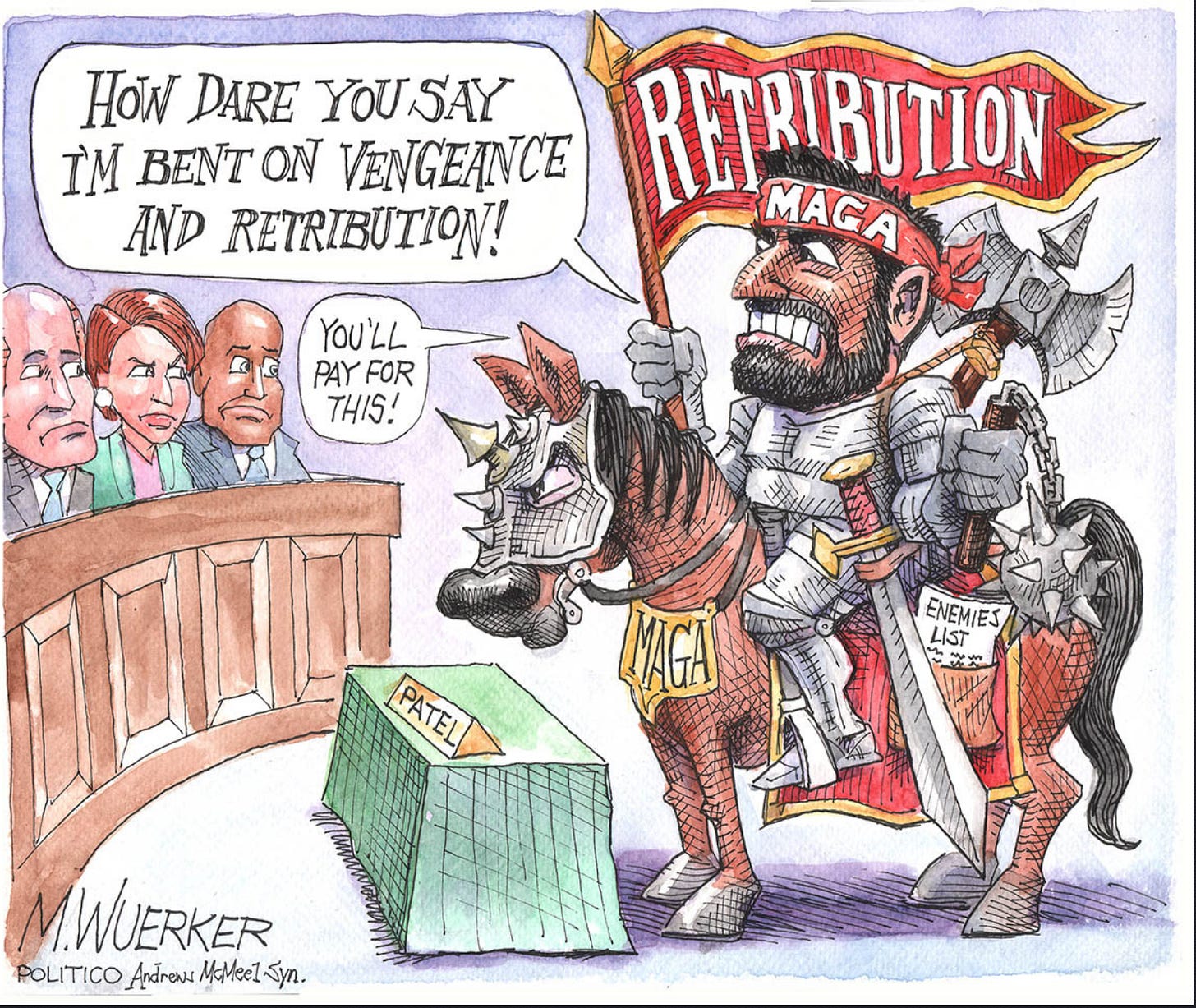The Buck Stops Somewhere Else
The initial handling of this week's air disaster by the new administration was shocking. It was only the start.

Amid a backdrop of the worst US aviation accident for many years, heartbreaking personal stories have been emerging of the tragic loss of life. In their random connectedness, they offer a beautiful snapshot of a nation’s people and their hopes and dreams. But everything about the initial handling of the disaster by the new administration was almost un-American.
President Trump strode straight past the opportunity early in his new presidency to act as consoler-in-chief and unite the country in sympathy for those grieving; instead wasting little time in speculating about the cause of the crash, blaming the diversity policies of previous administrations, as inflammatory a knee-jerk issue as immigration to his hardcore Maga base. It was telling – and desperately sad – that the Army took the unusual step of withholding the name of the female member of the helicopter crew at her family’s request.
Trump doubled-down, posting that DEI is “one reason our country was going to hell”, while across federal institutions, a vocabulary of inclusiveness and empathy was being – literally – erased from the public record as thousands of web pages were deleted.
While Trump’s press conference following the accident was, frankly, shocking in its crassness, the irony was hardly lost as Vice-President JD Vance, along with newly-confirmed Defense Secretary Pete Hegseth and Transportation Secretary Sean Duffy subsequently repeated their boss’s lines about “hiring standards”. But should we really have expected anything different?
Jonathan Lemire wrote at The Atlantic about similarities with Trump’s Covid briefings from his first term, with the President “showcas[ing] his instinct to immediately frame tragedies through his own ideological or political lens, facts be damned.” But even beyond an undermining of the nascent official investigation, there’s still something unsettling at a very base level about Trump’s need to fill any silence with the sound of his own voice, even when he has nothing meaningful to say. And, just as in the first term, while those disjointed, off-script diatribes may dominate public conversation until the next one, none of them leaves any positive resonance or inspiration.
It was merely a coincidence, therefore, that this week saw the anniversary of the Challenger disaster and Ronald Reagan’s subsequent address to the nation. Written for him by Peggy Noonan, it became a bipartisan yardstick by which official mourning was judged. As a blueprint for Presidential responses to tragedy it lasted for just shy of 40 years.
*
Move Fast and Break Things
It’s now almost eight years since Steve Bannon’s rallying cry of “deconstructing the administrative state” was all the rage (pun intended) in Washington DC. After the second full week of the new regime, that, together with his other infamous dictum to “flood the zone with shit”, is being made real literally in front of our eyes.
Fear and uncertainty abounds among government employees, exacerbated by a lack of confidence that the administration knows what it’s doing, even if it might have an idea of what it wants – which appears to be a potentially unstable cocktail of unrestrained institutional culling and straight-up retribution and intimidation designed to insulate the President and his allies from legal consequences.
The New York Times reported:
“Targets of Mr. Trump’s ire often found themselves facing investigations or other government actions during his first term. But it was only in the year before his defeat in 2020 that he began to develop a more systematic approach to purging the government of those he saw as foes and restocking it with loyalists — a playbook that he is executing now.”
But yet again we need to ask, should we really have expected anything different? It’s not like it wasn’t all written down in the hope they could eventually claim some kind of mandate for it.
Even though more people voted for someone not named Trump than for him, that won’t stop claims that anything and everything that happens next is somehow the will of the people – occasionally even with an exaggerated embellishment for dramatic effect – and that those same people knew what they were signing up for.
By now, it’s a fair indicator that if someone starts an interview answer by saying that the new President has an “overwhelming” “resounding” or “emphatic” mandate for what’s currently happening, chances are they know perfectly well he doesn’t. He’s also not, whatever anyone says, “bringing people together”.
It was no accident that the three highest-profile of Trump’s cabinet nominees all had hugely-distracting Congressional hearings this week: key national security appointments Tulsi Gabbard as Director of National Intelligence and Kash Patel as head of the FBI; along with Trump’s Health pick, Robert F Kennedy Jr. Collectively, it has been quite the circus.

But it was significant that the Washington Post editorial board chose to highlight the potential appointment of Russell Vought as head of the Office of Management and Budget (Vought, one of the architects of Project 2025, held the same post in Trump’s first term) on the grounds that he wants to allow the President to refuse to spend money that Congress has appropriated, as well as his “fixation” on purging the federal workforce. The paper writes:
“Unless [Vought] is rejected, this week’s muddle will become merely the opening salvo in a broader push to expand executive authority at the expense of the legislative branch — and the rule of law. “We are living in a post-Constitutional time,” Vought wrote in 2022.
“Presidents deserve significant deference in staffing their administrations. But Vought is not acceptable, given his combative disdain for Congress’s constitutional power of the purse and his refusal to abide by a vital reform enacted after Watergate to check the president’s authority.”
Democrats boycotted the Budget Committee vote which means Vought now goes forward for consideration by the full Senate.
But in a related move this weekend, the so-called Department of Government Efficiency assumed control of the Treasury’s payments system – basically the US government’s check book – which could give the administration a means of overriding payments previously approved by Congress.
The New York Times reports that DOGE teams “have begun demanding access to data and systems at other federal agencies, but none of those agencies control the flow of money in the way the Treasury Department does.”
“In a process typically run by civil servants, the Treasury Department carries out payments submitted by agencies across the government, disbursing more than $5 trillion in fiscal year 2023. Access to the system has historically been closely held because it includes sensitive personal information about the millions of Americans who receive Social Security checks, tax refunds and other payments from the federal government.”
As the President “wages war on his own government”, NBC’s Jonathan Allen writes on the inherent and inevitable conflict between different constituent parts of the coalition that brought Trump to power.
“Whether Trump can hobble the federal workforce and cut trillions of dollars from the budget without harming his own voters — and the Republicans who represent them in Congress — remains to be seen.”
A White House official told Allen:
“President Trump received a resounding mandate to streamline our gargantuan government to better serve the needs of the American people. He will use every lever of executive and legislative power to deliver.”
In an excellent column today, Ezra Klein writes that the single most important thing for the administration right now is to “keep everything moving fast” – witness the weekend’s tariff announcements (Canadian hockey fans booed the US anthem in Ottawa last night) or Marco Rubio’s threat to Panama, or the ramping up still further of a performative immigration crackdown.
“The impression of Trump’s power remains; the fact that he keeps stepping on rakes is missed. The projection of strength obscures the reality of weakness. Don’t believe him.
“You could see this a few ways: Is Trump playing a part, making a bet or triggering a crisis? Those are the options. I am not certain he knows the answer. Trump has always been an improviser. But if you take it as calculated, here is the calculation: Perhaps this Supreme Court, stocked with his appointees, gives him powers no peacetime president has ever possessed. Perhaps all of this becomes legal now that he has asserted its legality. It is not impossible to imagine that bet paying off.”
Klein continues:
“That is the tension at the heart of Trump’s whole strategy: Trump is acting like a king because he is too weak to govern like a president. He is trying to substitute perception for reality. He is hoping that perception then becomes reality. That can only happen if we believe him.
“The flurry of activity is meant to suggest the existence of a plan. The Trump team wants it known that they’re ready this time. They will control events rather than be controlled by them. The closer you look, the less true that seems. They are scrambling and flailing already.”
“Forget the myths the media's created about the White House. The truth is, these are not very bright guys, and things got out of hand.” – Hal Holbrook as Deep Throat and Robert Redford as Bob Woodward in ‘All The President’s Men’ (1976) (Warner Brothers)
*
The Show Goes On

On the upside, for whatever it’s worth, Friday was the last day of the last month with no baseball in it until November. On Monday, it will be 52 days until Opening Day.
February is Black History Month – regardless of what any Executive Order might say – and fifty years after Frank Robinson became baseball’s first Black manager, the game continues to struggle with the numbers of Black leaders in its ranks.
*
Read a couple of the project’s Q&As from the 2023 season – with Prof Chris Lamb of Indiana University, an author and researcher on Jackie Robinson and the integration of baseball; as well as with award-winning journalist and my fellow Cub fan John Wesley Fountain, who told me:
“Today kids in the city and suburbs dream of dunking like LeBron, of soaring like Ja Morant, of being great like Kobe. Or their sports dreams are of scoring touchdowns and landing million-dollar contracts and sneaker deals.
“The great American Pastime called baseball is generational among African-Americans. And it seems to have eluded so many Black boys with the acumen and talent to someday find their name and number etched in baseball glory in Cooperstown. I’m not sure baseball can or will ever live again in the hearts and dreams of little Black boys like it once lived in ours. But one can dream.”
***
Read also:
Unrelenting – We were warned. Experts told us how bad it was going to be, laid out the timeline for how it would unfold and what was likely to happen.
‘Wait, Did We Vote For This?’ – A glimpse of a potentially crucial splinter within the GOP, even before its figurehead has been inaugurated or its narrow majority in the House was sworn in.
Loyalty is the Only Currency – The steadily more jaw-dropping narrative through this past week, has obviously been a deliberate distraction from any serious policy-focused analysis of the direction of the incoming administration.


